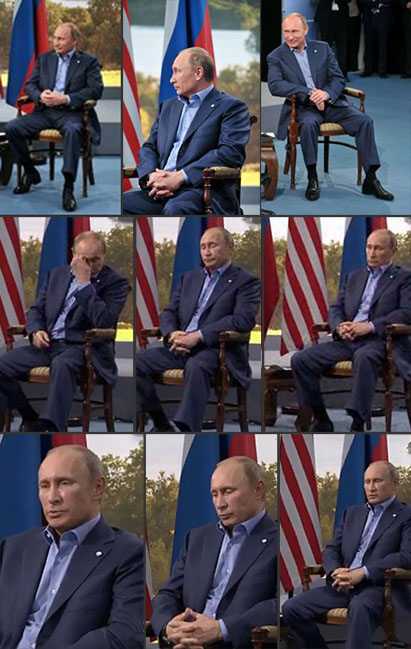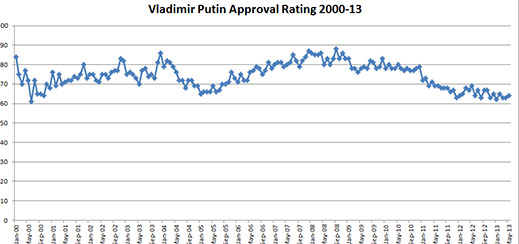
By John Helmer, Moscow
By the conventional polling and political measures, President Vladimir Putin ought to be the most relaxed figure at the G8 summit meeting in Ireland. If he wanted to, he might look straight at the cameras and tell the world he shares their opposition to starting another war in the string of wars the NATO alliance has already lost in Afghanistan, Iraq, and Libya; and is now threatening in Syria, Lebanon, Iran, Turkey too, not to mention Mali.
Instead, Putin displayed an unusual set of body signals rarely seen at events like these, or at his bilateral meetings with the same set of characters. Was he nervous, irritated, or plain angry?
Right now Putin is one of just two figures at the Irish summit with an approval rating above 65%; his next election date is years further off than the others; he is the only one whose approval rating has remained stable above 62% for more than a decade. He has seen off last year’s street opposition; nobodies announcing their flight to Paris are one-day wonders on Radio Liberty, Liberation, and the Guardian.

By contrast, Barack Obama’s rating is 45% and falling sharply. David Cameron’s is 31%; Francois Hollande’s is 29%, up slightly since it hit an unprecedented low of 25% in May. Angela Merkel’s rating ahead of the September elections in Germany varies between 60% and 68%. By these measures, the Syrian War party of Obama, Cameron and Hollande are the nervous ones, desperately trying to divert public attention from their political weakness, ward off party putsches, and rally extra-parliamentary support for a fresh round of regime change and killing abroad.
Putin’s stance ought to be relaxed, even if the London papers have been reporting the attempt by Cameron to corner Putin into signing a communique on Syria with loopholes former President Dmitry Medvedev once fell for over Libya. According to the Kremlin’s favoured diarist of such events, Kommersant’s Andrei Kolesnikov, Putin is indeed relaxed. The Kremlin selection of photographs has also included smiles and loose hands to suggest the same message.
But the signals Putin produced during his press conference with Obama suggest that when it came to the Syrian War, Putin had something quite different on his mind. According to the Kremlin text, Putin said: “we discussed problem spots on the planet, including Syria. There are still some aspects where our positions do not align, but we are united by a common aspiration to stop violence, stop the growth of victims in Syria and resolve the problem by peaceful means, including with the help of talks in Geneva. We agreed to push forward the peace talk process and push the parties to the negotiations table, organise talks in Geneva.”
The subscript is that by agreeing to “push” on Syrian President Bashar al-Assad to attend a peace conference (to which Assad has already agreed), Putin has extracted from Obama the undertaking not to pre-empt the negotiations with the start of heavy weapons flows to the Syrian opposition.
The Kremlin text of what Obama had to say also intimates a pullback from war, including both Iran and Syria. “On Iran, we both expressed cautious optimism that with the new election there, we may be able to move forward on a dialogue that allows us to resolve the problems with Iran’s nuclear programme. With respect to Syria, we do have differing perspectives on the problem, but we share an interest in reducing the violence, securing chemical weapons and ensuring that they’re neither used nor are they subject to proliferation and that we want to try to resolve the issue through political means if possible, so we will instruct our teams to continue to work on the potential of a Geneva follow-up to the first meeting.”
The implication is that Obama has removed the chemical warfare claim against Assad as the trigger for escalation of US, British and French military intervention, as well as air attacks from Israel. This has already drawn the countermoves – Iranian regular forces and Lebanese irregulars to retake Syrian ground lost to the Anglo-American forces, plus a Russian missile screen to deter no-fly zone tactics and aerial attacks by US or allied aircraft. That in turn has produced threats from the American war party to attack Russians head-on.
Putin and Obama jested in their concluding remarks about physical prowess. Obama – “we compared notes on President Putin’s expertise in Judo and my declining skills in basketball. And we both agreed that as you get older, it takes more time to recover.” Putin – “Mr President wants to relax me with the statement of his declining skills.”
Look again at the visual signals before interpreting what ironies the two men intended. Russia, along with Putin’s domestic standing, are being directly threatened by American, British and French policy in Syria. From the Russian point of view, this is provocation, intended not only for regime change in Damascus, but regime change in Moscow through making Putin look vulnerable to renewed opposition. Putin’s bluff is being called. To deter escalation to a multi-front war, Putin decided to show anger in his face, hands, and feet. That’s the Russian warning that the counter for provocation is pre-emption. Do Obama, Cameron and Hollande want to start a shooting war with Russia?











Leave a Reply